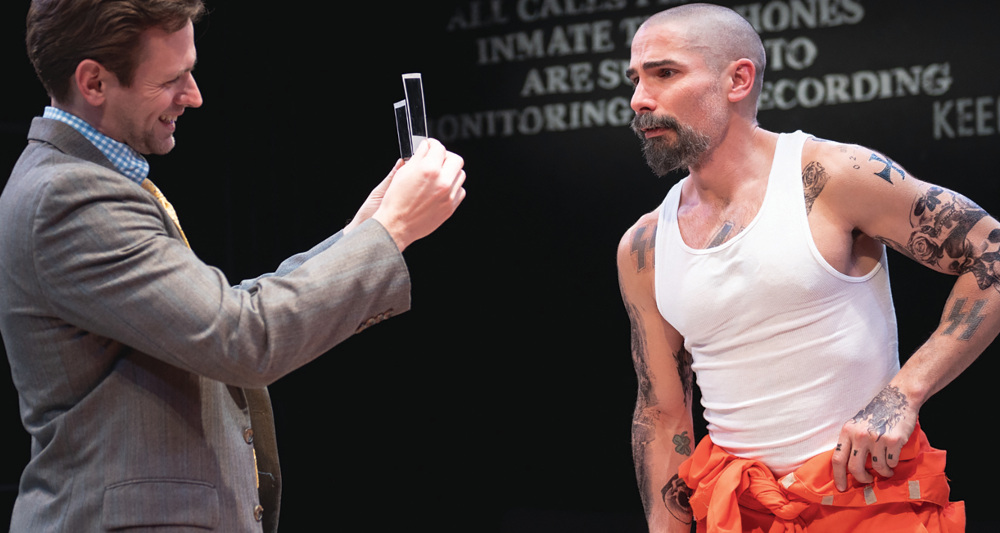I’m Ready to Talk Now, Traverse Theatre ★★★★
There are, inevitably, certain challenges when reviewing a one-to-one immersive show that’s already pretty much sold out its entire Edinburgh Fringe run (though there are rumours of some last-minute additional tickets for I’m Ready to Talk Now being released). For a start, influencing potential audience members to buy or not buy a ticket goes almost entirely out the window. In addition, giving too much away might spoil the impact of Oliver Ayres’s brief, fragile but hugely powerful creation for those who have already booked.
All that said, it’s the very form of Ayres’s show that generates I’m Ready to Talk Now’s gentle strength. Accept his welcome into his unassuming and appropriately clinical performance space, and you’ll struggle if you aim to avoid connecting with the performer. Somewhat disconcertingly, Ayres places the focus squarely on the lone audience member, their needs and expectations, not only dissolving borders between performer and watcher, but also encouraging a similar sense of honesty and vulnerability to those qualities that he himself displays throughout the work’s tender contemplations of illness, change and identity.
I’m Ready to Talk Now is rooted in Ayres’s autobiography, specifically a serious and long-unidentified medical condition that took hold just as he was beginning testosterone treatment (and the quiet transphobia that contributed to it effectively being ignored). Using projections, movement, immersive sound and an all-involving environment, Ayres travels through an appropriately woozy, dreamy night of isolation in a Melbourne Hospital. Beyond the show’s minimal storyline, however, there’s an unflinching contemplation of self, the old identity Ayres leaves behind, and the new one he’s maybe unprepared for, with a sense of both profound grief and semi-euphoria that are reflected in the soaring, operatic soundtrack by STOZ.
Disarmingly intimate and unavoidably involving, I’m Ready to Talk Now is a gently whirring empathy machine, one whose idiosyncratic form matches its compassionate message.
- Until 24 August
 Rift, Traverse Theatre ★★★
Rift, Traverse Theatre ★★★
It should feel like a deeply timely play. Two unnamed brothers, having both endured the same childhood traumas, end up following profoundly different lives. One is a successful novelist and academic, with a particular interest in questions of race and identity. The other, however, is incarcerated for murder, and while inside finds fellowship (and security, it has to be said) with a cohort of white supremacists.
But if Gabriel Jason Dean’s hard-hitting, semi-autobiographical two-hander looks as if it’s about to dissect possible paths into extremism, or the arbitrary social forces that lead one man into crime and another into high-flying success, it quickly swerves into something a lot more personal and, sadly, a fair bit less interesting. There’s nothing wrong, of course, in focusing on the men behind these roles, their personal hopes and ambitions – as Dean does persuasively in the cut and thrust of naturalistic dialogue. But as a result, much is left unsaid: prison brother, in particular, comes off as a bit of a mischievous scamp rather than a dangerous, hardened extremist, which makes outside brother’s attempts at education and rehabilitation seem like nice-to-haves rather than crucial turning points. The same could be said for the academic’s own miraculous rise through literary fame and scholarship, and the ruthlessness employed to achieve both. More importantly, however, it’s surely the issues and values at stake that are what grabs the imagination, rather than the ups and downs of the brothers’ relationship.
But if Rift feels like a play that’s answering a different question from the one it initially poses, it still does so powerfully and effectively. Matt Monaco combines playfulness and genuine threat as the incarcerated sibling, while Blake Stadnik (both pictured above) gives a fittingly slippery performance as his outside counterpart, his motives never entirely clear. Ari Laura Kreith’s direction is excellent in capturing the irregular movements of the brothers’ fractured conversations, even if Dean’s several-year-spanning timeline leaves the show with a somewhat unconvincing overall structure.
While it might have prodded and probed at urgent issues, Rift instead focuses on family ties and on/off relationships, and even its suggestion that trauma breeds yet more trauma feels a little undercooked.
- Until 24 August













Add comment